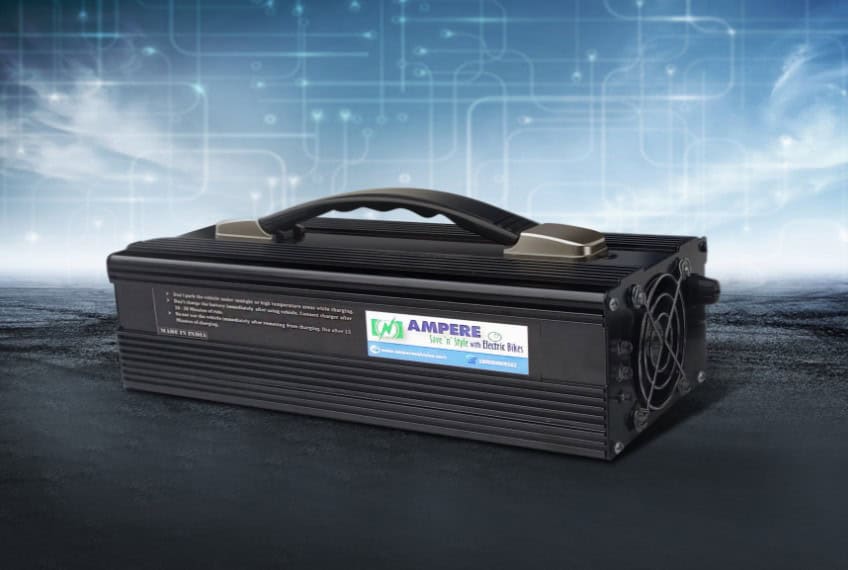
New Delhi: Last year in May, Coimbatore-based electric vehicle company Ampere Vehicles shot into limelight when the President of India launched its lead-acid battery charger.
This May, the company has upped its game further. This time the President is rolling out on Friday, Ampere’s Lithium-ion charger priced at Rs 3,000.
In addition, two of its scooters, V48 Lithium costing Rs 38,000 and Reo Lithium priced Rs 46,000, powered by Lithium-ion batteries, will also be launched. Each gain from the government subsidy of Rs 7,500.
E-scooters and Lithium charger will ride on the back of the large market potential that will open up once all the vehicles turn electric by 2030 and the shortage of sufficient charging infrastructure.
Hemalatha Annamalai, founder & CEO of Ampere Vehicles told ETAuto that the earlier lead acid charger was completely indigenised in-house and commercialised on all its vehicles after the launch last year.
“We are selling it to other OEMs, dealers as well as spare parts dealers. We are also in talks with larger OEMs, who are importing it currently,” added Annamalai.
Fortified with the experience of the last charger, Ampere Vehicles has transited to the Lithium-ion charger.
In 2009-10, the company had launched the Lithium foldable cycle. But at that time the market for Lithium-ion products was at a nascent stage and expensive.
Hence, the Lithium charger did not see the light of the day.
But now boosted with the government support coming for EVs for cutting down pollution, especially in the Delhi-NCR, it feels this is the right time to go to the market with its latest product.
“Since 2008, we did not stop its development as we have a dedicated power electronics team in our company, so we acquired advanced technologies from within India. We have a core team of six experienced power electronics designers but the total R&D team consists of 35 members,” elaborated Annamalai.
Citing its advantages, she said that the Lithium-ion battery is lightweight, around 7-8 kg in weight, compared to the lead acid battery that could weigh 35 kg. Hence, it required a lesser charging time of about 3-4 hours for a full charge compared to 8-10 hours for charging a lead-acid battery. Further, in the first 1 hour, it could fire up to 80 per cent of the charge.
Key aspects of the Ampere lithium charger are its auto cut off feature, wherein it automatically switches off after the battery is charged so that any damage is averted. It contains an over temperature protection feature, where it switches off in case of high temperatures, thereby protecting the battery.
The Lithium-ion charger starts sales from mid-May and will be made at the company’s Coimbatore plant that currently has a production capacity of 100,000 units annually. Both lead acid and lithium ion chargers will co-exist here.
Ampere has spent about Rs 7 crore till now on developing various electric vehicle components like chargers, DC-DC converters, motors and the Lithium-ion battery.
It has received technological and monetary support from the Technology Development Board (TDP) that mentors startups and emerging entrepreneurs to develop technology products.
ETAuto spoke to the secretary of TDB, Department of Science and Technology, who said it had given 50 per cent funding assistance to Ampere or Rs 3.5 crore in the form of a soft loan for the development of the 4 components. The loan could be repaid over a 4.5-year period at an interest rate of 5 per cent.
She elaborated that the lithium-ion battery charger contained 80 per cent local parts and could be used to charge vehicles for an 80-100 km range. Next generation of chargers will be required for a 150-200 km drive range.
In addition, Ampere is developing a lithium-ion battery that is almost complete and will see a rollout within 6 months.
Currently, Ampere has sold about 55,000 electric scooters since 2008 but is bullish that with chargers becoming available and being marketed through its 150 dealerships, sales would get a boost.
The company is targeting a product mix of 70 per cent lead-acid chargers and the balance 30 per cent lithium chargers.
